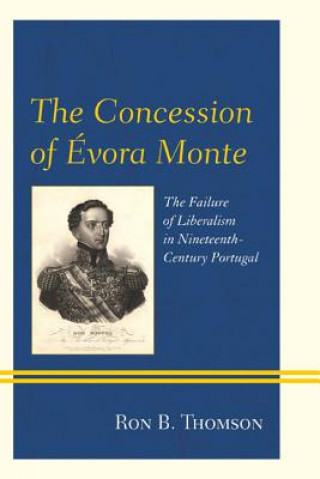
Kód: 05073692
Concession of Evora Monte
Autor Ronald B. Thomson
In a period when the monarch was the key figure in the Portuguese government, the struggle for the throne among members of the royal family was of crucial significance. Against a backdrop of new liberal ideas, economic conservatis ... celý popis
- Jazyk:
 Angličtina
Angličtina - Vazba: Pevná
- Počet stran: 186
Nakladatelství: Lexington Books, 2014
- Více informací o knize

3229 Kč
Dostupnost:
50 % šance Máme informaci, že by titul mohl být dostupný. Na základě vaší objednávky se ho pokusíme do 6 týdnů zajistit.
Máme informaci, že by titul mohl být dostupný. Na základě vaší objednávky se ho pokusíme do 6 týdnů zajistit.Prohledáme celý svět
Mohlo by se vám také líbit
-

Dark Lord: Eternal Detention
222 Kč -

Choctaw Resurgence in Mississippi
797 Kč -

All Aboard 2 Student's Book Pack
602 Kč -

Crossing Into America
883 Kč -

Destructive Turfgrass Insects
4018 Kč -

1941: Texas Goes to War
735 Kč -

Datenbanksysteme in B ro, Technik Und Wissenschaft
1830 Kč
Darujte tuto knihu ještě dnes
- Objednejte knihu a zvolte Zaslat jako dárek.
- Obratem obdržíte darovací poukaz na knihu, který můžete ihned předat obdarovanému.
- Knihu zašleme na adresu obdarovaného, o nic se nestaráte.
Informovat o naskladnění knihy
Zadejte do formuláře e-mailovou adresu a jakmile knihu naskladníme, zašleme vám o tom zprávu. Pohlídáme vše za vás.
Více informací o knize Concession of Evora Monte
Nákupem získáte 323 bodů
 Anotace knihy
Anotace knihy
In a period when the monarch was the key figure in the Portuguese government, the struggle for the throne among members of the royal family was of crucial significance. Against a backdrop of new liberal ideas, economic conservatism, and modernization, Dom Pedro challenged his brother, Dom Miguel (the Usurper), on behalf of his young daughter (Maria II) for the throne. But this struggle for the throne, and for a workable constitution, did little to change the fundamentally agrarian economy, so that in the end neither the monarch, nor the liberal ideals of the urban elite, nor foreign pressures had any fundamental effect on society as a whole. The Concession of Evora Monte describes the economic and political problems unleashed by the Peninsular War and the evacuation of the court to Brazil; the 1820 revolution, the first Portuguese constitution, and the counter revolution; the attempt by Dom Pedro when he became king (while also emperor of Brazil) to introduce the new Constitutional Charter and pass the throne on to his young daughter; the usurpation of the throne by his brother Dom Miguel; the War of the Two Brothers in which Dom Pedro defeated Dom Miguel and forced him into exile. The signing of the Concession in 1834 marked the end of the war, but it did not bring peace and stability. The changes introduced by the victorious Dom Pedro did not solve the basic issues of Portuguese society, nor did the efforts of his daughter, Maria II, during the 1830s and the 1840s. Several attempts were made to impose a new liberal constitution on the country, but in the end it was the formation of new political parties that shared governing after 1850 which brought stability. The country remained conservative despite the modernization which came to the cities and penetrated the countryside to a degree. This book argues that liberalism in Portugal was an urban phenomenon involving a very small minority of the people, and points to a variety of reasons for this. Portugal remained a rural, conservative society into the twentieth century and throughout the Salazar regimes until, perhaps, the Carnation Revolution in 1974.
 Parametry knihy
Parametry knihy
Zařazení knihy Knihy v angličtině Humanities History Regional & national history
3229 Kč
- Plný název: Concession of Evora Monte
- Autor: Ronald B. Thomson
- Jazyk:
 Angličtina
Angličtina - Vazba: Pevná
- Počet stran: 186
- EAN: 9780739193310
- ISBN: 0739193317
- ID: 05073692
- Nakladatelství: Lexington Books
- Hmotnost: 444 g
- Rozměry: 158 × 231 × 19 mm
- Datum vydání: 11. November 2014
Oblíbené z jiného soudku
-

Hundred Years' War on Palestine
338 Kč -

Ethnic Cleansing of Palestine
358 Kč -

History of Japan
406 Kč -

Ten Myths About Israel
336 Kč -

Strange Death of Europe
410 Kč -

Decline and Fall of the Roman Empire
130 Kč -

Secret History
320 Kč -

God's Playground A History of Poland
1700 Kč -

Mayflower
388 Kč -

How to be a Victorian
357 Kč -

Plantagenets
334 Kč -

General's Son
427 Kč -

Iran: A Very Short Introduction
249 Kč -

Temples of Karnak
3800 Kč -

Cuneiform
276 Kč -

Twenty Years A-Growing
249 Kč -

History of Witchcraft in England from 1558 to 1718
453 Kč -

China in Africa
894 Kč -

Islandman
249 Kč -

Bohemian Paris
415 Kč -

Lancaster And York
490 Kč -

Alexiad
427 Kč -

Modern France: A Very Short Introduction
269 Kč -

Inside Hitler's Greece
522 Kč -

Diana: Her True Story - In Her Own Words
306 Kč -

The Fourth Turning
393 Kč -

The Oxford History of Ancient Egypt
383 Kč -

Churchill: The Power of Words
410 Kč -

Palestine
545 Kč -

Korean History in Maps
709 Kč -

Great Gatsby (Wisehouse Classics Edition)
409 Kč -

Viking Way
1144 Kč -

The Thirteenth Tribe
309 Kč -

My Promised Land
358 Kč -

Vanished Kingdoms
514 Kč -

Age Of Revolution
410 Kč -

Life and Death of Anne Boleyn
584 Kč -

Coming of the Third Reich
464 Kč -

Children of Ash and Elm
464 Kč -

Europe Between the Oceans
798 Kč -

Socialism Betrayed
477 Kč -

303 Squadron
464 Kč -

Ancient Celts, Second Edition
628 Kč -

Dancing in the Glory of Monsters
396 Kč -

Battle of Britain: Luftwaffe Blitz (Images of War)
606 Kč -

Age of Confucian Rule
851 Kč -

Beyond Band of Brothers
410 Kč -

Benjamin Franklin
410 Kč -

On China
462 Kč
Osobní odběr Praha, Brno a 12903 dalších
Copyright ©2008-24 nejlevnejsi-knihy.cz Všechna práva vyhrazenaSoukromíCookies


 Vrácení do měsíce
Vrácení do měsíce 571 999 099 (8-15.30h)
571 999 099 (8-15.30h)